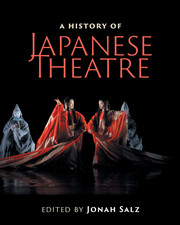Book contents
- Frontmatter
- Contents
- List of figures
- List of tables
- Contributors
- Contributors’ biographies
- Foreword
- Acknowledgments
- Note on Japanese terms
- List of abbreviations
- Timeline
- Editor's introduction
- I Traditional theatres
- Preface to Part I Japanese civilization arises
- II Modern theatres
- Preface to Part II
- 6 Birth of modern theatre: shimpa and shingeki
- Interlude Modern comedies and early musicals
- Interlude Takarazuka: all-girls’ revue and musicals
- 7 Rise of shingeki: Western-style theatre
- Interlude Manzai and Yoshimoto vaudeville comedy
- 8 Wartime colonial and traditional theatre
- Interlude Kami-shibai: picture-card storytelling
- 9 Maturing shingeki theatre
- Interlude Postwar musicals and commercial theatre
- 10 Sixties Theatre
- Interlude Butoh: dance of darkness and light
- 11 Contemporary theatre
- Interlude Tokyo: world theatre capital
- Interlude Charting Tokyo theatre today: 24 November 2012
- Interlude Modern theatre tomorrow: interview with Oriza Hirata
- III Arcs and patterns
- IV Theatre architecture
- Preface to Part IV Evolution of Japanese theatre architecture
- V Theatre criticism
- VI Intercultural influences
- Epilogue: Frozen words and mythology
- Further reading
- Index
- References
9 - Maturing shingeki theatre
from Preface to Part II
Published online by Cambridge University Press: 05 July 2016
- Frontmatter
- Contents
- List of figures
- List of tables
- Contributors
- Contributors’ biographies
- Foreword
- Acknowledgments
- Note on Japanese terms
- List of abbreviations
- Timeline
- Editor's introduction
- I Traditional theatres
- Preface to Part I Japanese civilization arises
- II Modern theatres
- Preface to Part II
- 6 Birth of modern theatre: shimpa and shingeki
- Interlude Modern comedies and early musicals
- Interlude Takarazuka: all-girls’ revue and musicals
- 7 Rise of shingeki: Western-style theatre
- Interlude Manzai and Yoshimoto vaudeville comedy
- 8 Wartime colonial and traditional theatre
- Interlude Kami-shibai: picture-card storytelling
- 9 Maturing shingeki theatre
- Interlude Postwar musicals and commercial theatre
- 10 Sixties Theatre
- Interlude Butoh: dance of darkness and light
- 11 Contemporary theatre
- Interlude Tokyo: world theatre capital
- Interlude Charting Tokyo theatre today: 24 November 2012
- Interlude Modern theatre tomorrow: interview with Oriza Hirata
- III Arcs and patterns
- IV Theatre architecture
- Preface to Part IV Evolution of Japanese theatre architecture
- V Theatre criticism
- VI Intercultural influences
- Epilogue: Frozen words and mythology
- Further reading
- Index
- References
Summary
With Japan's defeat in World War II, shingeki (modern theatre) tasted freedom from government constraint for the first time, enjoying a spectacular revival. Three companies became dominant in the 1950s, as new artists emerged while veteran artists continued their activities. Yet through failure of practitioners to reflect collectively on shingeki's wartime responsibilities, coupled with reversals of American Occupation policies and interference of the Japanese Communist Party, shingeki eventually lost direction and vitality as a movement.
Criticism of shingeki was raised from the mid-1950s from within and without, leading to the rise of angura (avant-garde) theatre, discussed in the following chapter. Massive resignations from major shingeki companies took place in the 1960s–1970s and experiments with Brecht and avant-garde theatre by major shingeki companies could not bridge the gap. From the mid-1970s, the surging angura showed signs of returning to shingeki, but the latter could not revitalize itself, either before or after the bursting of Japan's bubble economy and end of the Cold War. With their last founding members gone by the end of 2012, and theatre receding as a popular pastime, major shingeki companies are commissioning plays by “post-shingeki” playwrights, among other things, to engage contemporary audiences in a new age.
Revival under the Occupation, war responsibility, and the red purge
Japan's defeat brought about a dramatic change to the environment in which shingeki could operate. In October 1945, the GHQ (General Headquarters) of the Occupation authorities abolished all restrictions issued by the state on theatre, including the notorious Peace Preservation Law. Shingeki, long under strict government control, tasted freedom for the first time in its history, leading to its sudden revival. In December that year, shingeki artists in Tokyo presented a joint production of Chekhov's The Cherry Orchard in a symbolic demonstration of the genre's revival.
Shingeki's revival has been characterized as “sweeping,” but the road to revival was by no means smooth. Such bumpiness was due to “the weighty issue of politics and art” underlying various issues in the postwar shingeki movement. War responsibilities were one vital issue. In October 1945, the Shingeki Roundtable Conference was held to discuss the specifics of the genre's revival. Kubo Sakae, one of the organizers, proposed to eliminate fellow organizers from the roster, including Kubota Mantarō.
- Type
- Chapter
- Information
- A History of Japanese Theatre , pp. 267 - 284Publisher: Cambridge University PressPrint publication year: 2016
References
- 1
- Cited by

